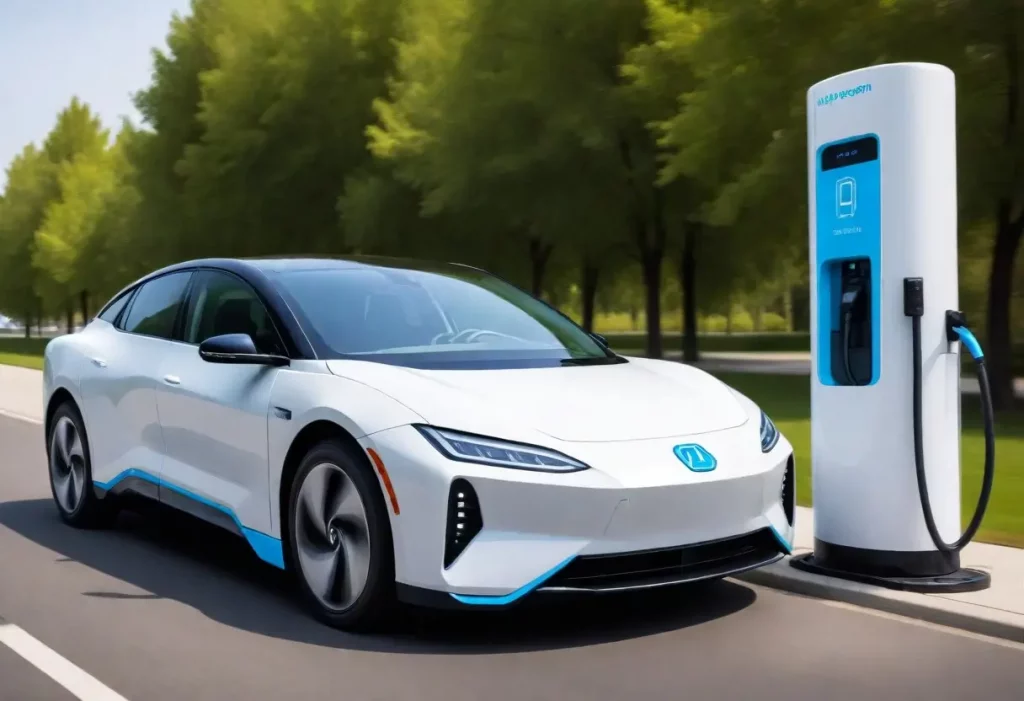Imagine the year 2024, and the automotive world is abuzz with the latest developments in alternative fuel technologies. You’re standing at a crossroads—one path leads to a sleek electric vehicle (EV) charging at a modern station, while the other winds towards a hydrogen fuel cell vehicle being refueled in minutes.
This scenario isn’t just hypothetical anymore; it’s the reality many car buyers face today as they decide between hydrogen and electric vehicles. But which technology is ahead in this eco-friendly race?

Hydrogen vs. Electric Vehicles: The Comprehensive 2024 Guide (PDF)
The Current State of Hydrogen and Electric Vehicles
In the duel between hydrogen fuel cell vehicles (FCEVs) and battery electric vehicles (EVs), electric cars seem to have the upper hand in terms of both popularity and infrastructure. Last year alone, over a million EVs were sold in the U.S., starkly contrasting with the fewer than 3,000 hydrogen cars sold.
Yet, the tides could be shifting. With $7 billion in federal grants awarded to boost hydrogen production and the anticipated launch of a hydrogen-fueled Honda CR-V, interest in hydrogen is reigniting.
The Technical Breakdown
Electric Vehicles: EVs are powered by large battery packs that typically range from 60 to 100 kilowatt-hours (kWh). These batteries are charged via the electric grid and power an electric motor. Because they contain no internal combustion engine or multi-speed transmission, EVs are simpler and can be incredibly efficient—using up to 95% of the electrical energy for motion.
Hydrogen Vehicles: Unlike EVs, hydrogen vehicles use a fuel cell instead of a large battery pack. These cells generate electricity by stripping electrons from hydrogen gas, which is stored in pressurized tanks within the vehicle. The only emission? Water vapor. However, the fuel cell technology, while promising, has been slow to develop a reliable and widespread infrastructure.
Model Availability and Infrastructure
Electric Vehicles: From luxury brands to mainstream makers, approximately 57 EV models are available in the U.S., and this number is expected to quadruple by 2040. With a robust and growing network of over 9,500 high-power charging stations nationwide, accessibility is one of EVs’ strongest selling points.
Hydrogen Vehicles: Hydrogen car options are significantly more limited, with only the Toyota Mirai and Hyundai Nexo currently available, and exclusively in California. The infrastructure for hydrogen fueling is also limited, with only 53 stations in California, making national expansion a challenge.
Driving Range and Refueling
Electric cars now average about 290 miles per charge, with some models reaching over 500 miles. However, recharging can take anywhere from 20 minutes at a fast-charging station to several hours at home. In contrast, hydrogen vehicles can be refueled in just about five minutes and offer an average range of over 370 miles, which could be a significant advantage for long-distance drivers.
Environmental Impact and Fuel Costs
While EVs are generally cleaner than internal combustion engines, the source of their electricity—often fossil fuels—can diminish their environmental benefits. However, as the grid becomes greener, so do EVs. Hydrogen production, mainly derived from natural gas, poses environmental challenges unless produced using renewable energy.
On the cost front, while electricity prices vary, they generally provide more mileage per dollar compared to hydrogen fuel, which remains expensive due to its production and purity requirements.
The Road Ahead
The debate between hydrogen and electric vehicles isn’t just about which is superior today but what each will become tomorrow. As technological advancements and infrastructure developments continue, the gap between these two clean-energy vehicles may narrow.
With automakers and governments investing heavily in both technologies, the ultimate winner will be the one that best addresses the needs of consumers and the planet. But as we look toward a greener future, one question remains: will the advancements in hydrogen technology soon close the gap with the now dominant electric vehicles?






